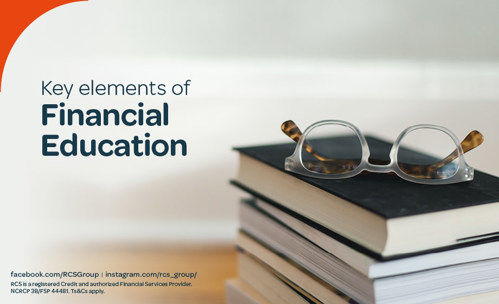Key Elements of Financial Education
11 AUGUST 2023
Part of being a functioning member of society involves making day-to-day financial decisions that influence our life and lifestyle. These decisions can sometimes be difficult to make, so having all the knowledge you can about finance and how money works is key.
WHY DO WE NEED FINANCIAL EDUCATION?
As an adult, we need to be financially literate as this equips us with the ability and knowledge we need to manage our money effectively. Financial literacy is gained through being financially educated and putting what you learn to practice in your everyday life.
However, many secondary even higher education institutions do not make financial education a part of the set curriculum despite its great importance in everyday life. This inevitably leads to a large number of adults that are not financially educated and end up making decisions that result in debt, losses and other setbacks. It is crucial to have access to financial education sooner rather than later so that we have all the tools we need to be successful and to thrive in life.
5 KEY COMPONENTS OF FINANCIAL EDUCATION
1. Earning
The term “earning” refers to money that you are receiving from work (or active income), or as investment returns (or passive income). “Income” is used interchangeably with earnings and in most cases can mean the same thing.
Having an income comes with taxes and knowing what tax you have to pay as well as how to manage your annual tax returns are crucial. Personal income tax is the normal tax that is paid on your income from remuneration, profits, pensions, royalties amongst others. You are liable to pay income tax if you earn more than R83 100.00 annually and if you are younger than 65 years old (for the 2021 year of assessment, 1 March 2020 - 28 February 2021).
Your income is a key asset of your financial state and should also be protected in cases where it could be jeopardised. Having an income protection plan can ensure this security. View the benefits of having an income protection plan with RCS here.
2. Saving & Investing
We have all heard that we should save for the future, and for the future of our family. Start saving and putting money away when you are young. Do this by having a savings and/ checking account put away money whenever you are able to on a regular basis.
There are many easy ways to save money:
- Record your expenses through statements and receipts.
- Budget for savings and limit overspending.
- Cut your spending on non-essentials.
- Set short term (1-3 years) and long term (4+ years) savings goals.
Money that you have put away can grow over time and allows you to build up a retirement plan or be able to invest long term. Investing allows your money to become more valuable over time and avoid inflation. Read more about how to invest and its risks in our lifestyle article. Get in touch with a financial advisor to start your investment journey.
3. Spending
Spending is something we do every day, with small purchases like buying clothes to larger spending opportunities like travelling. With online shopping on the rise, it has become easier to have access to the things we want.
In order to make informed spending decisions, it is important to know the difference between your needs and wants. Control your spending, especially when using your credit card. Although it may be convenient, avoid impulse buys with your credit card so you do not come to regret it at a later stage.
When making large purchases, make sure to do your research and compare prices of products to determine which is the most value for money. Budgeting is the most useful tool to ensure that you monitor and control your spending. Stick to a simple personal budget and track where you spend unnecessarily.
4. Borrowing
At some points in life, borrowing money or taking a loan out is a necessity. When used correctly for the right reasons, it can be a lifesaver. However, without proper financial education, many people fall into debt from using credit and/loans. It is important to have a financial plan set so that you will be able to make repayments on time and ensure borrowed money can help you accumulate different kinds of wealth.
Taking a loan out is not an easy financial decision and there are fees and other key points to know before doing so:
- Initial fees: This is the fee paid when you first take out a loan, depending on the type of loan and your chosen credit provider.
- Interest rates: Different banks & consumer finance businesses and different types of loans have various interest rates. Find out which rate you can manage.
- Late fees: These are penalties incurred when you do not pay on time. Be sure to never be late with payments.
5. Protecting
Sometimes we take for granted the financial capabilities we have. It is thus important to protect your assets and your future when you are able, to avoid risks in life. For example, if you have taken out life insurance and in the case of accidental death, your family will receive financial assistance. This protects the financial future of your family as well.
Insurance also promotes positive saving habits by allowing you to invest in a financially stable future. One way of doing this is planning for your retirement, should you wish to do so. In order to live independently when you retire, there are a few things to consider:
- Start planning as soon as you are able to.
- Be wary of the risks of your investments.
- Adapt and update your retirement plans when needed.
THE ROAD TO FINANCIAL LITERACY
There are many sources and services on financial education that can help you make informed decisions. Being financially literate is something that we should all strive to be, and the sooner we are taught key components, the sooner and more secure our future will be.
MORE ARTICLES ABOUT
RELATED ARTICLES

Education
28 AUGUST 2025
SA Research: How Parents Impact a Child’s Financial Intelligence

Education
12 JUNE 2025
Cultivating Tomorrow's Leaders: Equipping Young South Africans for Life’s Challenges

Education
28 MARCH 2025
